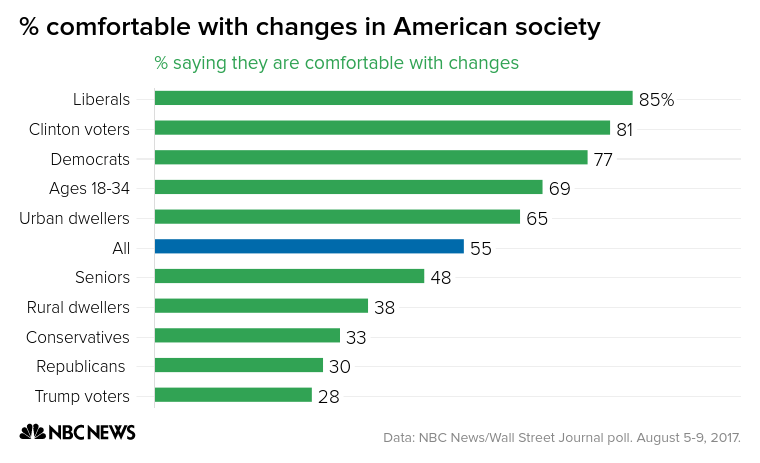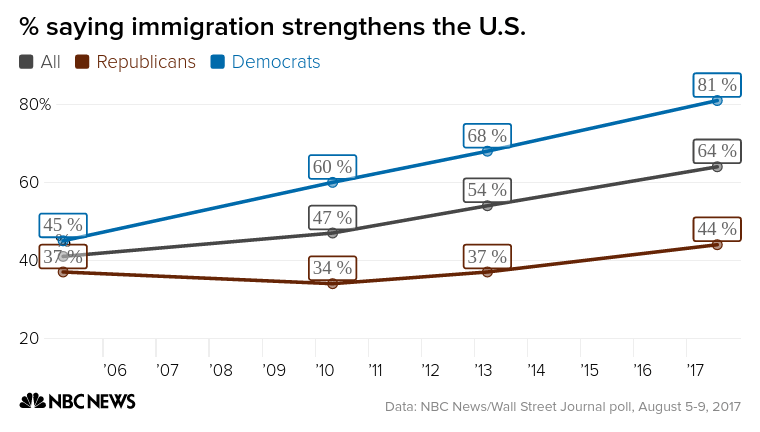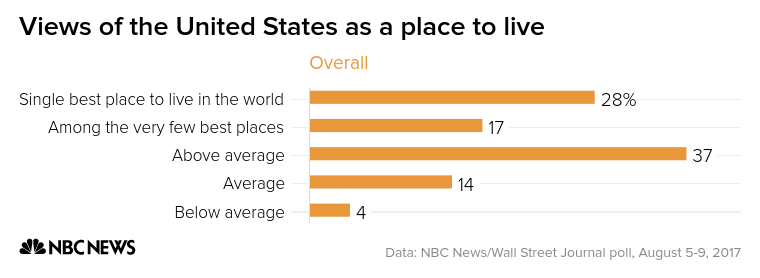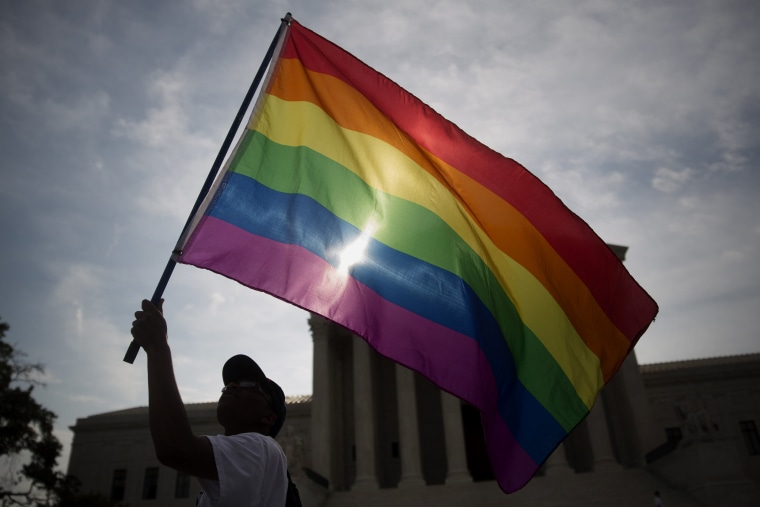First Read is your briefing from Meet the Press and the NBC Political Unit on the day's most important political stories and why they matter.
WASHINGTON — Think about the biggest political stories over the last month — Charlottesville, the Arpaio pardon, Trump’s DACA move. They’re stories, in large part, about culture and the country’s changing diversity, which remain some of the main fault lines in American politics, according to a new NBC/WSJ poll examining social trends.
Overall, 55 percent of respondents in the poll say they’re comfortable with the nation becoming more diverse and tolerant of different lifestyles, gender roles, languages, cultures and experiences. Twenty-four percent say they’re uneasy with these changes, because they believe what makes the United States special is the country’s uniquely American experience, speaking English and sharing a background that brings everyone together. Another 19 percent say they’re neither comfortable nor uneasy.
But the poll finds striking differences by political party, geography and age when it comes to the percentage of Americans saying they’re comfortable with the changes to American society:

Bottom line: More than 8-in-10 Clinton voters are comfortable with a changing America, but only a quarter of Trump voters are. “The ‘Culture Wars’ have been with us forever, and they remain today,” says Democratic pollster Peter Hart, who conducted this survey with Republican pollster Bill McInturff.
“America has gone through rapid change, and the results of the Social Trend survey tell us that a majority of Americans are now comfortable with our increasingly diverse country,” McInturff adds. “But this sits at the heart of the Clinton-Trump divide, as 81 percent of Clinton voters say they are ‘comfortable’ with these changes, compared to only 28 percent of Trump voters.”
More than 60 percent believe immigration strengthens the U.S.
The NBC/WSJ poll also shows nearly two-thirds of Americans (64 percent) saying that immigration strengthens the United States, while 28 percent say it weakens the country.
That 64 percent saying immigration strengthens the nation is the highest percentage on this NBC/WSJ poll question that dates back to 2005, when just 41 percent said it strengthened the country.
But once again, there’s an important political divide in this current poll: 81 percent of Democrats and 85 percent of Clinton voters say immigration strengthens the United States, versus just 44 percent of Republicans and 38 percent of Trump voters who agree.

A plurality of Americans say globalization has been good for the country
In addition, for the first time in the poll’s history, a plurality of Americans — 49 percent — believe that globalization has been good for the country, because it has opened up new markets for American products and resulted in more jobs.
That’s compared with 40 percent who think that globalization has been bad.
In past NBC/WSJ polls — in 1997, 2007, 2008 and 2014 — either majorities or pluralities said that globalization has been bad.
By party in the current poll, 59 percent of Clinton voters, 54 percent of Democrats and 49 percent of independents say globalization has been good for the country, compared with 41 percent of Trump voters and 42 percent of Republicans.
The percentage of those approving of same-sex marriage reaches another high
Also in the NBC/WSJ poll, 60 percent say they support same-sex marriage, which is up from 59 percent in 2015 and 53 percent in 2013.
By party in the current poll, 79 percent of Clinton voters, 77 percent of Democrats and 59 percent of independents favor gay marriage, versus 42 percent of Republicans and 37 percent of Trump voters.
50 percent are worried the government will go too far in restricting gun rights
But showing that not all of these issue trends are pointing in a more liberal or progressive direction, 50 percent of respondents say they are more concerned that the government will go too far in restricting gun rights — which is up from 35 percent who said this back in 1995.
By comparison, 45 percent say they’re more concerned that the government will not do enough to regulate access to firearms.
By party, 78 percent of Trump voters, 77 percent of Republicans and 49 percent of independents are worried the government will go too far here, versus 24 percent of Democrats and 23 percent of Clinton voters.
America the Pessimistic
Here’s another headline from our NBC/WSJ social trends poll: The survey finds that less than a third of American adults — 28 percent — called America the “single best place to live in the world,” with another 17 percent calling it “among the very few best places.”
More respondents put United States closer to the middle of the pack, with 37 percent calling America merely “above average” and 14 percent rating the country as “average.” An additional four percent called the U.S. “below average” on the global scale.

Asked to rate the national character of America on a scale of one to 10, just 14 percent of those polled offered a “strong” rating of eight or higher, while 34 percent suggested a “weak” rating of four or lower. That’s a noteworthy slide in less than two decades; in 1998, 23 percent of Americans gave the country’s character a strong rating, while just 20 percent characterized it as weak.
Trump administration to DACA recipients: “Prepare for departure”
Per NBC’s Kristen Welker and Daniel Arkin: “Trump administration talking points distributed on Tuesday had a blunt message for DACA recipients: ‘Prepare for departure.’ That guidance appeared in a memo (.pdf) that was sent to stakeholders in the immigration debate by the Department of Homeland Security, just hours after the Trump administration announced it would end DACA.”
Meanwhile, President Trump is sending mixed messages about his DACA move. “Congress now has 6 months to legalize DACA (something the Obama Administration was unable to do). If they can't, I will revisit this issue!” he tweeted last night. (Revisit?)
And on “Today” this morning, Sen. Lindsey Graham, R-S.C., begged Trump to provide leadership on what to do about DACA. “We need to define what an acceptable Dream Act looks like,” he said, referring to efforts to enact legislation to protect the so-called Dreamers. “But the president has to lead that effort in the House.”
Trump heads to North Dakota to sell tax reform
Finally, President Trump travels to North Dakota, where he will give remarks at 4:05 pm ET on tax reform. Ali Vitali and Frank Thorp note that vulnerable Democrat Heidi Heitkamp will ride on Air Force One with Donald Trump today.



